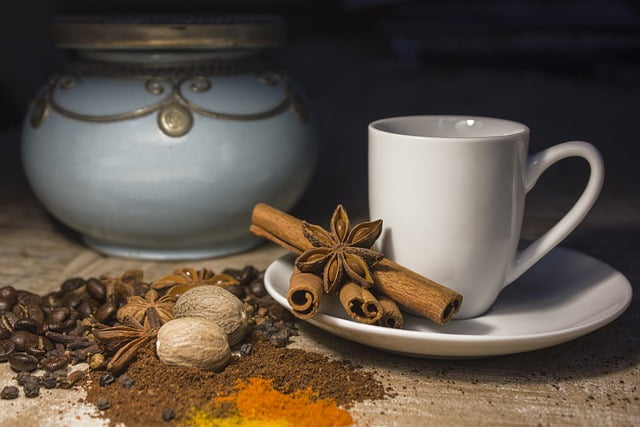Table of Contents
The air has started to crisp like the apples that are now finally in season. Sweaters are coming out of storage and leaf peeping is the new fashionable weekend entertainment.
And then there’s pumpkin spice. We don’t have to go far to encounter this sweet blend in our grocery store shelves, household cleaning products, and its influence even in the most unexpected places (pumpkin spice engagement ring, anyone?). Pumpkin pie spice typically contains cloves, allspice, ginger, nutmeg, and cinnamon. Not only do they cause a warming effect in chillier temperatures, but they also provide many health benefits. In this three-part series, we’ll uncover more about each constituent of this delectable fall mix.
Perhaps the most prominent part of the blend is cinnamon— a spice that has been used medicinally and in cooking for hundreds of years. It is worth taking a deeper dive.
Origins of Cinnamon
Cinnamon comes from a tropical evergreen tree called the Cinnamomum verum. To bring it to the spice we know and love today, harvesters extract the inner bark from the wood and allow it to dry. As it dries, it curls into sticks. Those sticks can be sold or ground into powder.
There are four types of cinnamon; two of which are most commonly used.
Ceylon, which is native to Sri Lanka and has a lighter brown hue, is considered to be “true cinnamon” and has a mildly sweet flavor.
Cassia (one variety is Saigon) is native to southern China and has a darker hue. It is the most common form of cinnamon in grocery stores and tends to be more affordable. The flavor is stronger and spicier than that of Ceylon.
However, cassia contains a toxic substrate called coumarin (approximately 1%) which can be carcinogenic. Because of this, researchers recommend using only the Ceylon variety as a supplement to avoid toxicity. Try to limit consumption of cassia to 1-2 teaspoons a day – which should be plenty if you tend to use it only in cooking as a complementary nutrient.
All health benefits from cinnamon largely stem from its essential oil cinnamaldehyde, which is present in every variety of the spice and provides its unique smell and flavor. Here are some of the many health benefits this powerful spice contains.
Antioxidants in Cinnamon for Immunity

As colder months settle in, our immune systems tend to be tested much more than they were in the summer sun. Antioxidants found in the form of polyphenols within cinnamon can neutralize free radicals, which are responsible for the development of viruses and even other diseases.
In times of stress, our bodies tend to quickly become depleted of antioxidants and other nutrients to maintain homeostasis. Whether you find yourself in a time of stress or if everyone in your household or office happens to have the latest virus, eating meals with a combination of cinnamon, anti-inflammatory turmeric, and black pepper can be especially nourishing and strengthening for the immune system.
Antibacterial and Antifungal
The antibacterial and antifungal properties of cinnamon are so poignant that researchers have proposed it as a possible non-toxic herbicide for organic farming. Maybe you don’t have a farm or the means to pay for pounds of cinnamon to spray on your plants, but you may benefit from sprinkling some on your sliced fruit to increase shelf life. One study demonstrated that it can inhibit the proliferation of Escherichia coli and Listeria in food products.
If you’re being guided through a gut healing protocol in order to eliminate bacterial or fungal overgrowths, you may benefit from adding more cinnamon into your diet as a support. One study suggests that cinnamon decreases the colonization of Helicobacter pylori (H. pylori), a bacteria that can cause gastritis ulcers, and other diseases when overpopulated in the gut.
Promoting Healthy Fat
Did you know that all fat is not created equal? We’re not talking about omega 3s and 6s here. There are actually different types of fat inside your body. The fat we are often most aware of is white adipose tissue, which is simply stored energy. Having some stores is essential to our well-being, but if we accumulate more than our body needs to be healthy, white fat can put a person at risk for obesity and many other diseases.
Introducing brown fat. This type of fat (which is most prevalent in infants) can improve our metabolism by breaking down blood sugar and fat molecules to maintain body temperature. Brown fat can develop naturally through eating a well-balanced diet, exercising, getting good sleep, and even exposure to cold temperatures.
According to a 2017 study with mice, those who were given cinnamaldehyde experienced a browning of white fat tissue. The mice also experienced a decrease in body weight. Though more studies need to be done on humans to see if it has the same effectiveness, it doesn’t hurt to incorporate more of the spice into your diet.
Cinnamon Mitigates Insulin Resistance
Another component of maintaining a healthy body weight has to do with hormones. These chemical messengers are like vital players in an orchestra – when they are in sync with the conductor (or the brain), know their part, and play it well, the body functions beautifully. When one section is out of touch with another or is too prominent, it can not only sound bad but also cause problems.
Insulin is a hormone that regulates blood glucose levels and originates in the pancreas. Its levels increase whenever we eat to stabilize the amount of sugar in our blood. Over time, if the body continues to receive too much sugar and insulin chronically activates, cells can stop responding to insulin. In that case, a person can become insulin resistant. When that happens, a person is more at risk for developing diabetes and obesity.
Cinnamon’s powerful essential oil can help mitigate the process of insulin resistance. It does this by supporting the activity of insulin sensitive glucose transporters. When the body is more sensitive to insulin, it is more able to respond like a trained instrumentalist responding to a cue. In addition, cinnamon can help slow the breakdown of carbohydrates in the gut, curbing a blood sugar spike.
It’s no coincidence that cinnamon often tastes good paired with sweet things. Though most processed sweets with pumpkin spice will likely cause a blood sugar spike, consider adding cinnamon to fresh fruit or minimally sweetened treats to help curb the spike and add delicious flavor.
Improving Cognition
Insulin resistance doesn’t only affect the proliferation of diabetes and obesity; it can also affect cognitive function and the proliferation of Alzheimer’s disease. Cinnamon contains phytochemicals that increase the brain’s ability to use glucose, which can boost overall cognitive behavior. This sweet spice can help you say goodbye to sugar brain!
Recipes Using Cinnamon
Is your mouth watering too? Pumpkin spice lovers – and those who prefer more savory flavors – can equally enjoy the complimentary and headlining traits of this spice. Here are some recipes to bring your cooking and health to another level:
Entering fall armed with some new tricks for an age-old spice will surely bring warmth to your homes and to your stomach. Next month we’ll take a look at the health benefits of ginger and nutmeg.
Learn more about the health benefits of cinnamon and many other spices!
The health benefits of herbs and spices are covered in detail in both of our programs, the Nutrition Therapist Master Certification (NTMC) and Natural Food Chef (NFC) program. In the NTMC course Intro to Herbology, Supplements, and Laboratory Assessments there is a whole module dedicated to the therapeutic use of herbs and spices. In the NFC program you will have the pleasure of not only learning about herbs and spices but you will get to cook with (and eat) them every day you’re in class! Attend an informational webinar or cooking demonstration to learn more.
About the author: Lisa (Driscoll) Lopes is a certified Nutrition Therapist Master through NTI’s Nutrition Therapist Master Program. Having studied journalism and vocal performance in undergrad, she enjoys using her voice to share the benefits of living a holistic, integrated lifestyle in writing. You can find more of her writing in the Baltimore Sun, Classical Singer Magazine, Capital News Service, and FOCUS blog.
Images:
- Image by Daria-Yakovleva from Pexels
- Image by terrapp from Pexels





More Stories
United Healthcare’s ransomware attack shows why supply chains are under siege
Nutrition Tips For Ramadan | JM Nutrition
Probiotics for IBS | The Nutritionist Reviews